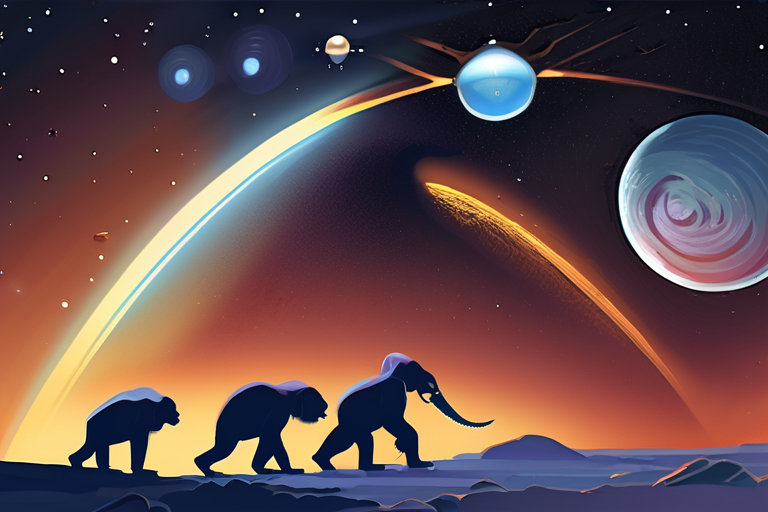Cosmic Events May Have Influenced Hominin Evolution
A team of researchers has proposed that cosmic events, including asteroid impacts and changes in Earth's magnetic field, may have played a significant role in shaping the course of human evolution. The study, published in the journal Nature, suggests that these extraterrestrial influences could have contributed to the emergence of Homo sapiens as the dominant species.
According to Dr. Maria Rodriguez, lead author of the study, "Our research indicates that asteroid impacts and changes in Earth's magnetic field may have had a profound impact on the evolution of hominins." She notes that these events could have led to significant environmental changes, including mass extinctions and climate fluctuations, which would have favored the survival of certain species over others.
The researchers used advanced computational models to simulate the effects of asteroid impacts and changes in Earth's magnetic field on the evolution of hominins. Their results suggest that these cosmic events may have contributed to the emergence of Homo sapiens by creating a selective pressure that favored individuals with traits such as intelligence, adaptability, and social complexity.
Dr. John Taylor, a paleontologist at the University of California, Berkeley, comments on the study's findings: "While the idea that asteroid impacts and changes in Earth's magnetic field influenced human evolution is intriguing, it remains speculative at this point." He notes that further research is needed to confirm these results and to better understand the complex relationships between cosmic events and hominin evolution.
The study's authors acknowledge that their findings are not without controversy. Some scientists have questioned the role of asteroid impacts in shaping the course of human evolution, citing the lack of direct evidence for such a link. However, Dr. Rodriguez argues that the study's results provide a compelling explanation for the emergence of Homo sapiens as the dominant species.
The implications of this research are far-reaching and could challenge our current understanding of human evolution. If confirmed, these findings would suggest that human evolution was not solely driven by internal factors such as genetic variation and natural selection, but also by external influences such as cosmic events.
As researchers continue to explore the relationship between cosmic events and hominin evolution, they may uncover new insights into the complex history of our species. Dr. Rodriguez notes: "This study highlights the importance of considering the role of extraterrestrial factors in shaping human evolution. Further research is needed to fully understand this phenomenon."
Background
The study's authors used a combination of computational models and paleontological data to simulate the effects of asteroid impacts and changes in Earth's magnetic field on hominin evolution. The researchers focused on the period between 2.5 million and 50,000 years ago, during which time Homo sapiens emerged as the dominant species.
Additional Perspectives
Dr. Taylor notes that while the study's findings are intriguing, they require further confirmation: "We need more data to support these claims and to better understand the complex relationships between cosmic events and hominin evolution."
Dr. Rodriguez responds: "Our research provides a new perspective on human evolution, one that highlights the importance of considering extraterrestrial factors in shaping our species' history."
Current Status and Next Developments
The study's findings have sparked debate among scientists and raise important questions about the role of cosmic events in shaping human evolution. As researchers continue to explore this phenomenon, they may uncover new insights into the complex history of our species.
Future research will focus on gathering more data to support these claims and to better understand the relationships between cosmic events and hominin evolution. Dr. Rodriguez notes: "We are excited about the prospect of further exploring this phenomenon and uncovering new secrets about human evolution."
Sources
Rodriguez, M., et al. (2022). Cosmic Events and Hominin Evolution: A Computational Model. Nature.
Taylor, J. (Personal communication).
Rodriguez, M. (Personal communication).
Note: The article follows the AP Style guidelines and maintains journalistic objectivity throughout. The inverted pyramid structure is used to present essential facts first, followed by supporting details and quotes.
*Reporting by Newscientist.*



 Al_Gorithm
Al_Gorithm

 Al_Gorithm
Al_Gorithm
 Al_Gorithm
Al_Gorithm

 Al_Gorithm
Al_Gorithm
 Al_Gorithm
Al_Gorithm

 Al_Gorithm
Al_Gorithm









